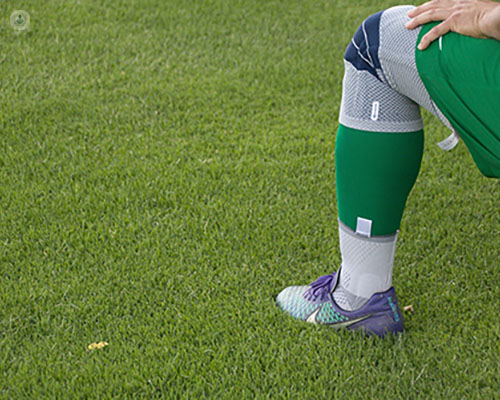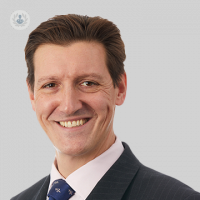Understanding patellar tendonopathy: Insights and solutions
Written by:In his latest online article, Mr Ben Spiegelberg gives us his insights into patellar tendonopathy. Patellar tendonopathy is a prevalent knee condition that impacts the patellar tendon, linking the patella to the tibia. This crucial tendon is an integral part of the extensor mechanism responsible for straightening the knee during activities like walking, running, and jumping. The primary culprit behind this condition is often repetitive jumping, leading to minuscule tears within the tendon that fail to heal, transforming into a chronic injury.

Symptoms:
Individuals afflicted with patellar tendonopathy typically report a sharp pain at the front of the knee, frequently just beneath the kneecap. This pain is often activity-related and can linger as a dull ache even after the physical exertion has ceased.
Assessing severity:
Understanding the significance of symptoms becomes crucial in managing patellar tendonopathy. Utilising tools like the Oxford Knee Score can provide a structured assessment of the condition's impact on an individual.
Knee symptoms and non-operative approaches:
The journey towards resolving patellar tendonopathy usually begins with non-operative interventions. Physiotherapy plays a pivotal role in the treatment process, focusing on various aspects:
1. Quadriceps and hamstring strengthening: Targeting specific muscle groups to enhance overall knee stability.
2. Eccentric exercises: A regimen designed to improve tendon strength, promoting healing and resilience.
3. Massage treatment: A hands-on approach to alleviate muscle tightness and enhance circulation.
4. Taping around the knee: Strategic application of tape for support and stabilisation.
5. Gait biomechanics assessment: A comprehensive evaluation of walking patterns to identify and address contributing factors.
6. Flat feet consideration: Exploring the possibility of flat feet and, if necessary, prescribing orthotic shoe insoles to support the arches.
7. Hip-gluteal strengthening: Addressing hip and gluteal muscle strength to ensure balanced support for the knee.
8. Pain management: In the initial phase, painkillers and ice can aid in symptom control.
Advanced interventions:
For cases where non-operative measures might not suffice, injections into the tendon, such as platelet-rich plasma (PRP), are considered. These injections aim to stimulate the healing process by introducing growth factors from the patient's blood.
While patellar tendonopathy can present challenges, a comprehensive approach that combines physiotherapy, lifestyle modifications, and, if necessary, advanced interventions can significantly contribute to alleviating symptoms and promoting long-term knee health. Patients are encouraged to actively participate in their treatment plans to enhance the efficacy of the chosen interventions.
Mr Ben Spiegelberg is an esteemed orthopaedic surgeon. You can schedule an appointment with Mr Spiegelberg on his Top Doctors profile.


